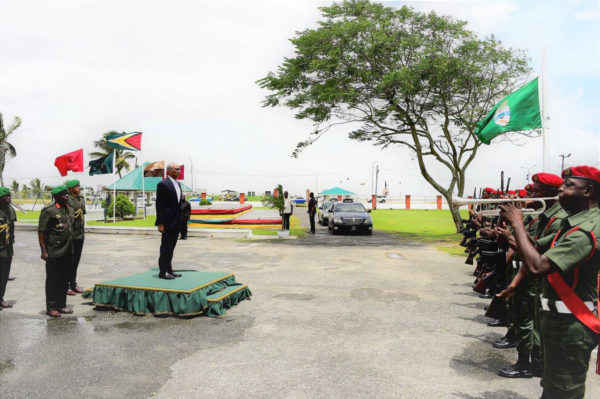President David Granger yesterday said that the “fragile fabric” of the country’s social cohesion could potentially be damaged by what he dubbed “reckless” and “provocative” calls.
“Reckless remarks about an uprising and provocative calls for the mobilization of foot soldiers have the potential to rip apart the fragile fabric of social cohesion that we enjoy,” Granger told officers of the Guyana Defence Force (GDF) during the opening of its Annual Officers’ Conference at Base Camp Ayanganna.
Granger did not identify the authors of the calls and made no more comments about them in his address.
The opposition PPP recently warned the government that closure of more sugar estates could prompt displaced workers to organize major protest actions.

During his address, Granger highlighted the army’s role in protecting the country’s natural resources and he also welcomed plans to revive the reserve force.
He noted that Guyana is becoming a green state and the GDF shares the responsibility for exercising guardianship over the country’s flora, fauna, marine and natural resources. However, he said threats could arise from illegal activities, which result in the pollution of the country’s waterways or damage to the protected areas and national parks. Most alarming, he pointed out, it was discovered last year that there were dredges in the country’s most iconic park.
Granger added that he was very interested in army Chief of Staff Patrick West’s presentation on the transformation of the force and his reintroduction of “total national defence.” This, he said, must be based firmly not only on military defence but also on civil defence and social and environmental defence. “These pillars cannot be buttressed by the force alone or even by the government. National defence doctrine must emphasise the importance of every citizen taking responsibility for our national natural patrimony,” he said.
The president also highlighted the complexity of the country’s terrain, which he said presents colossal challenges for military deployment, as well as the inadequacy of the country’s hinterland infrastructure. He said insufficient aerodromes, bridges, highways and stellings hinder access and impede deployment and as a result one of the challenges faced by the force is to create an engineer corps that can improve national infrastructure.
These factors, according to Granger, should be considered in designing and refining the defence doctrine. Moreover, he noted that the Defence Act prescribes that the GDF “shall” consist of a regular force and a reserve force. “And my Minister of Legal Affairs reminds me that the word shall implies an absence of option or choice, it is mandatory,” he said, before adding that it was never the intention of the framers of the Act that the reserve force should ever be dissolved, diminished or discountenanced.
He said he was happy that the Chief of Staff, whose presentation the media was not privy to, announced that the reserve force will once again be established on equal footing with the regular force as called for in the Defence Act.
Granger emphasized that the doctrine of total and national defence must be a comprehensive one and given the country’s limited financial and material resources “defence doctrine must be based on maintaining a small, regular force and a relatively large reserve force, which can be deployed to all parts of the country to respond to emergencies.”
In doing so, he said that the force must be spread in all ten administrative regions since it is not a coastal force or urban organization but a national defence force.
Granger pointed out to the officers that the world’s large states are well aware of the vulnerability of small states like Guyana and the special characteristics of security threats which they face. He said that in keeping with the principles set out under the United Nations, Guyana respects other states and expects them to respect the country.
He noted that under the Defence Act, the GDF has been charged with the defence of maintenance of order in Guyana and such other duties that may from time to time be defined by the Defence Board.
“This implies that the force must be constantly in a state of readiness to deploy troops and in a short notice to conduct operations by day or by night, in any weather or terrain, in any part of the country to meet any emergency,” the president told the officers.
According to the President, threats in the form of domestic and transnational crimes are being reduced because of the GDF’s performance of its role and he identified the reduction of attacks by pirates as being as a result of more robust surveillance by arms of the GDF and by the combined army and police task force.
Further, he said that the ground forces continue to maintain vigilance on the borders, the coastland and in the rivers.
“Threats to Guyana’s security are of both longstanding circumstances and of recent occurrence. Guyana, therefore, may pursue a tripartite path in accordance with its national interest and in accordance with the charter of the United Nations. That path is based on national self defence; we do not have any military treaty with any other state, it is based on regional inter-dependence, we are part of the regional Caribbean security system,” he said.
While the Ministry of Foreign Affairs will continue to be the country’s first line of defence, the president added, threats might arise from elements who wish to undermine internal security.